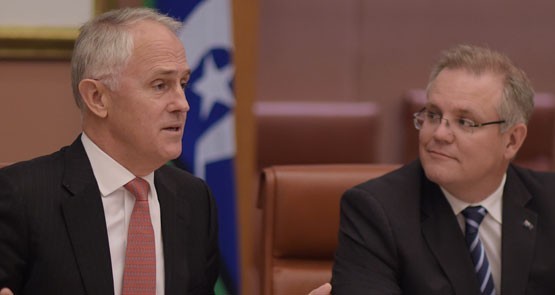
The Australian Office of Financial Management (OAFM) has dashed all hopes that a recent slight decline in gross debt was the start of a downward trend. Gross debt at the end of January, according to Monday’s update, smashed upwards through the $400 billion barrier again to $408.2 billion.
Australia’s gross debt actually declined in December. It fell to $398.7 billion, from $400.3 at the end of November. Of course, there was no joyous celebration at that decline. Because that would have alerted the world to the $400 billion breach — which Treasurer Scott Morrison understandably wanted kept an on-water operational matter.
The increase in gross debt since the last federal election is now $130.8 billion — up from $277.4 billion in September 2013 — an increase of 47.2%.
Monday’s AOFM release bolsters the concerns of Treasury chief John Fraser, who gave a pretty blunt assessment of the government’s failings last Thursday. Addressing the Sydney Institute, he said spending was too high, much of it unwise, tax collections too low, the deficits not sustainable and debt expansion since the last election unjustifiable:
“Net debt is approaching levels not seen since the early 1990s recession, which at that time was the highest since World War II … Around two-thirds of Commonwealth public debt is held by non-resident investors. This share has risen since 2009 and remains historically high.”
The criticisms are fair. The Coalition in opposition indicated it had “identified $50 billion of savings, for … a reduction of $30 billion in net debt”.
The December monthly report from the Finance Department was the other document to land with a thud on the Treasurer’s desk in recent days. This shows net debt — the AOFM’s gross debt minus certain investments. The Finance document also reveals interest paid on net debt. Unfortunately for Prime Minister Malcolm Turnbull and Morrison, the net figures are worse than the gross numbers.
Net debt in December was $274.1 billion, up $99.5 billion on the September 2013 level of $174.6 billion. That’s an increase of 57.0%.
Interest paid in December was $1,352 million, or $43.6 million per day. That’s about $10 million a day more than Labor was paying in 2013.
John Fraser noted this sternly as an overspending issue:
“Commonwealth interest payments have also risen sharply, contributing to the overall rise in the payments-to-GDP ratio and this is despite a period of remarkably low borrowing costs.”
He doesn’t hold much hope for a reduction any time soon:
“The Commonwealth’s interest bill has reached over a billion dollars a month. This is projected to more than double within the decade, unless action is taken to improve our budgetary position.”
Clearly, the solution is to reverse recent tax cuts — especially to the rich — to cover the gap between current income and required expenditure. Fraser noted that the budget deficit has deteriorated by some $37.9 billion since the Coalition took office: “Of course, successive downgrades to tax receipts have been the main driver of this deterioration.”
Fraser insisted: “We are not in a crisis.” With a sovereign currency, Australia will always be able to repay the debt. The government will never run out of money. But the $43 million has to be paid. Every day. With two-thirds of that going to non-resident investors, they will spend much of this buying Australian businesses, city real estate, rural properties and other assets. Several foreign governments and corporations are doing this already.
Finally, Fraser addressed a reality the government and mainstream media seem reluctant to acknowledge — and that the rest of the world is now advancing strongly:
“Faced with the same difficult choices that Australia now faces, many developed countries have managed to undertake significant budget repair in a relatively short time. While at the same time, they have seen economic growth prosper.”
That is a gentle understatement. Thirteen wealthy countries in the Organisation for Economic Cooperation and Development (OECD) were in recession back in 2012 and 2013. Today, none.
Many OECD countries are now paying down debt accumulated during the global financial crisis. They include New Zealand, Canada, Ireland, Norway, Iceland, Hungary, Israel, Germany, Poland, the Czech Republic and Turkey. So are others outside the OECD.
If they can, so can Australia.








Well said Alan…thank you for the update.
Just proves, yet again, that contrary to MSM reports, the current government are NOT doG’s gift to economic management of this country!
In fact, they are far worse than the previous Labor government!!
Another reason to raise the GST – so the poor can pay more?
Your point about the need to raise taxation on those who can most afford it is spot on Alan but Fraser will not accept that. Like the government and Paul Keating, he believes the clap trap about the need to keep taxes low and to pay down debt through the “growth” that less tax on the rich and more tax on the poor is supposed to bring. This nonsense still has MSM support but it is frustrating that Paul Keating can be found urging the same policy under the heading that we have to trim our spending because the fall in commodity prices has reduced what the world pays us.
That point is obviously true: we have to trim our spending but it is not obviously true that the trimming has to occur on health and education and welfare for the poor. That is the current government line. Alan makes the point that the trimming should occur on the rich, where increases in taxes will give them less to spend or save. The deflationary impact of their loss of income will be least, since their savings can fall and reductions in their spending is more likely to reduce imports.